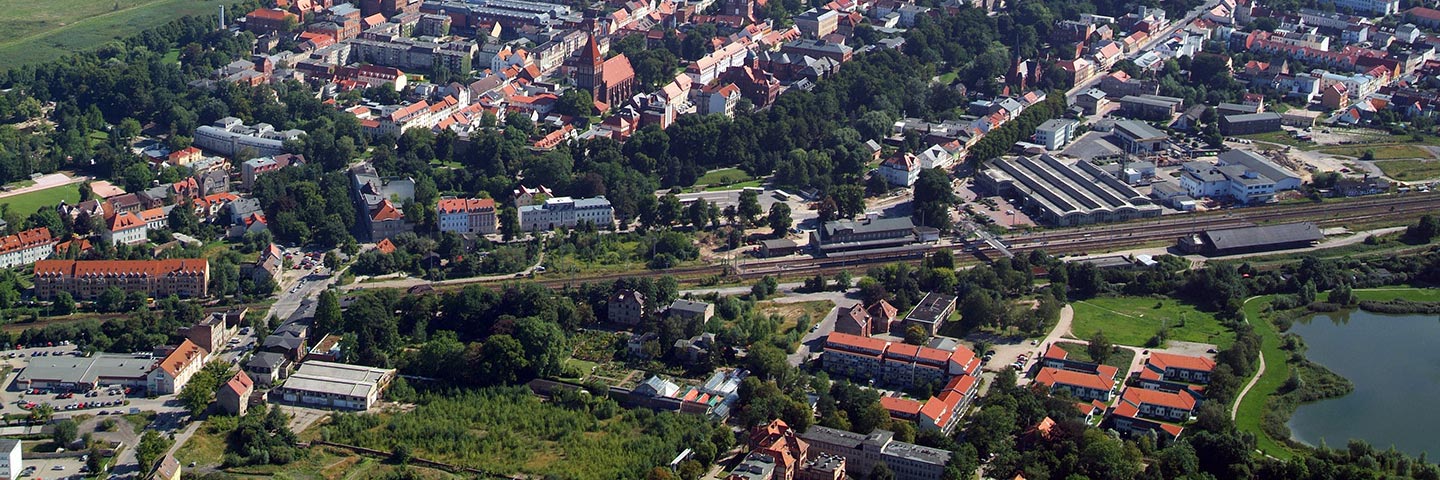News
2017
by NK
„Walking in paludi wonderland“

Have fun with the GMC’s Christmas carol
20/12/2017 Here the GMC’s little Christmas present to all peatland lovers: Escape the christmas routine with John Couwenberg’s lyrics for “Winter wonderland“! The Greifswald Mire Centre wishes fun, a nice Christmas and a happy new year!
Peatlands drained, used for cropping
Ditches deep, will need blocking
Rewetting the site, we’re happy tonight
Walking in a wet paludiland
Let’s reduce gas emissions
Novel crops, new ambitions
Let’s make the land whole, and substitute coal
Walking in a wet paludiland
Want to continue? Here the complete lyrics.
by NK
First paludiculture strategy
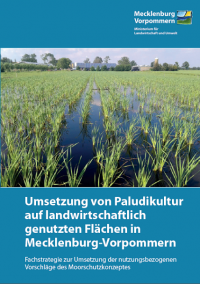
Minister and GMC present strategy for Mecklenburg-Vorpommern
13/12/2017 Mecklenburg-Vorpommern is pioneering in peatland conservation for decades and more than 26,000 ha have been rewetted in this federal state in Northeast-Germany. Now the state has also a strategy for the implementation of paludiculture on agriculturally used peatlands. The strategy builds on the peatland conservation strategy (2009) and summarises state of the art knowledge on paludiculture, a selection of particularly well suited forms of paludiculture for this region, and necessary next steps for implementation. Maps depicting peatland areas suited for paludiculture are globally unique. The strategy has been prepared by the Greifswald Mire Centre in collaboration with representatives from agriculture and nature conservation and was launched by minister Dr. Till Backhaus 12th December 2017 in Schwerin.
by NK
Global Landscape Forum
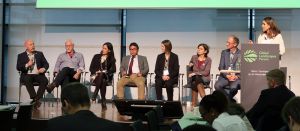
Side event hosted by UN Environment and GMC
13/12/2017 Peatlands are vital fort the global landscape but extremely threatened by degradation. Peatland experts such as Dr. Alue Dohong (Indonesian Peatland Restoration Agency) and Prof. Hans Joosten (GMC) will share their knowledge at a side event at the Global Landscape Forum in Bonn at 19th December 2018. Under the title „Smoke on water – Countering global threats from peatland loss and degradation“, findings and recommendations from the recently launched Global Peatlands Initiative report Smoke on water will be presented. The Greifswald Mire Centre hosts the side event together with UN Environment at the World Conference Center Bonn (Landscape Pavilion) at 9:00-10:30 am.
by NK
Setting course for EU peatland policies
CINDERELLA workshop at Brussels
13/12/2017 “Setting the course for EU policies on peatland climate mitigation” was discussed at a workshop 6th December 2017 in Brussels. Jointly organised within the projects CAOS - climate smart agriculture on organic soils (Thünen Institute) and CINDERELLA (Greifswald University, partner in the GMC) it was another step to better integrate peat soils into the EU policy framework. With representatives from farmers associations, NGOs, research, European Commission (both DG Agriculture and DG Environment), business sector and national administration there were diverging positions. Some participants stressed the importance ofpeatland utilisation for food production and sovereignty. The GMC representatives pointed out effects and perspectives of EU policies on peatlands, underlined that greenhouse gas emission reduction is currently insufficiently addressed, and promoted alternative paludiculture crops like cattail for building materials.
by NK
Smoke on Water presented on COP23
Rapid Response Assessment against peatland loss and degradation
15/11/2017 Titled Smoke on Water – countering global threats from peatland loss and degradation the Global Peatlands Initiative (GPI) presented the „UNEP Rapid Response Assessment“ at COP23. The report describes how to localise, manage and conserve the remaining peatlands worldwide. The Greifswald Mire Centre – partner in the Global Peatlands Initiative – contributed substantial expertise e.g. data and pictures of the Global Peatland Database. Presenting the report at the high level side event, Erik Solheim, Head of UN Environment, said that it is absolutely crucial that peatlands are protected and that the carbon is kept safely in the ground.” Tim Christophersen (UN Environment), Ibrahim Thiaw (UN Environment Deputy Executive Director) and Siti Nurbaya Bakar (Minister of the Environment of Indonesia) stressed the significance of intact peatlands for climate protection and the importance of rewetting. Prof. Hans Joosten of the Greifswald Mire Centre put it in a nutshell: "Keep peatlands wet, if drained rewet them, if you use them, use them wet!“
More details in the UNEP press release Smoke on water – countering global threats from peatland loss and degradation.
by NK
GMC at the COP23 – 2nd week
Peatland restoration project = UNFCCC lighthouse activity
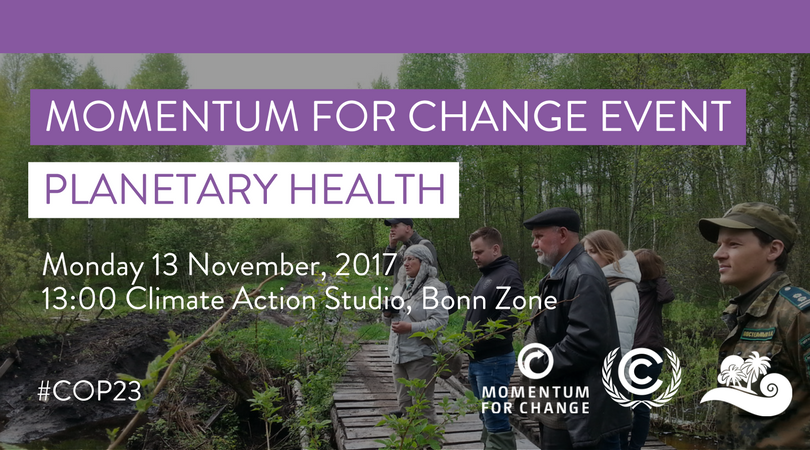
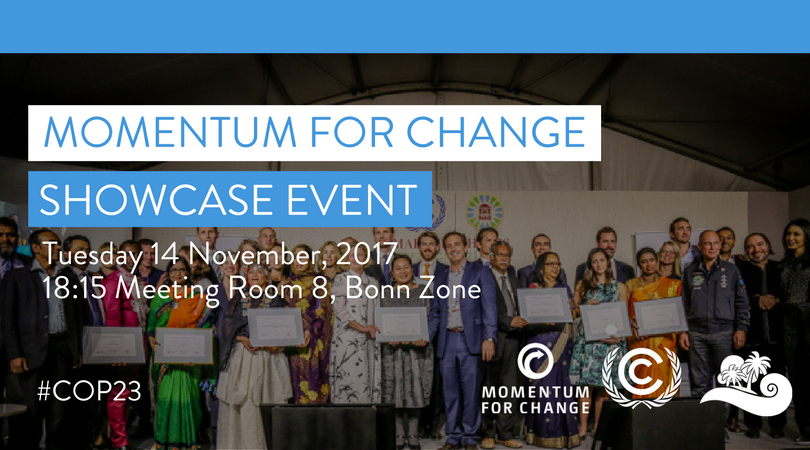
09/11/2017 Restoring peatlands in Russia is one of the largest on-the-ground peatland restoration projects in the world. It is successfully preventing peat fires and subsequent health damages to local people and simultaneously reducing greenhouse gas emissions. The UNFCCC has chosen it to be one of 19 initiatives receiving the United Nations Momentum for Change Climate Solutions Award as lighthouse activities. Wetlands International and the Michael Succow Foundation, partner in the Greifswald Mire Centre, will present the joint project at a roundtable event within the Focus on Planetary Health on Monday 13th Nov. from 13.00-13.45 pm at the Climate Action Studio. A special Showcase Event will feature the 19 winners of the 2017 Momentum for Change Award at 14th Nov from 6.15-8.00 pm at Meeting room 8, Bonn Zone.
At 15th Nov. the Greifswald Mire Centre is part of a high level event Good peatland governance to strenghten economic, social and ecosystem resilience organised by the Global Peatlands Initative. It will be the launch of the Rapid Response Assessment on peatlands at 4.45 pm (meeting room 10, Bonn Zone).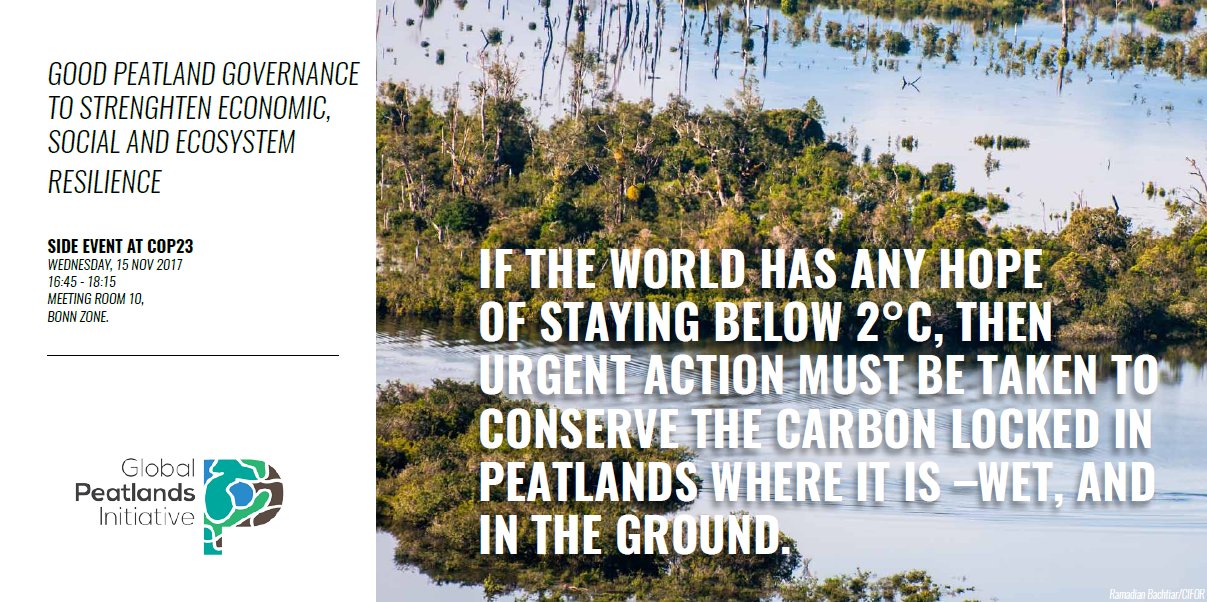
by NK
UN reveals emissions gap
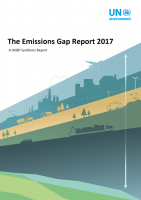
GMC contribution to UN report kicking off world climate conference
08/11/2017 Published at the beginning of the world climate conference (COP23), the recent „Emissions Gap Report“ of UN Environment summarises current national mitigation efforts and the largest potentials for improved climate protection. This year the report addresses not only the gap in 2020, but also necessary trajectories for later years, especially 2025 and 2030. A key element of the report is an overview on how to close the global emissions gap, for example by peatland restoration. The report has been produced by UN Environment with an international team of experts and with support by the German government. Prof. Hans Joosten‘s (Greifswald Mire Centre) contribution as a co-author is based on data of the Global Peatland Database.
by NK
GMC at the COP23 – 1st week
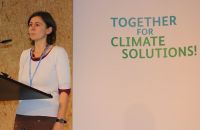
Bringing peatlands into the focus
6/11/2017 During the UNFCCC COP23 the Greifswald Mire Centre is contributing expertise on peatlands in several side events to raise awareness on their potential for climate protection. On 6th November Franziska Tanneberger talked about peatlands as sinks for carbon and sources for carbon emissions at the side event Towards a new compact on peatlands for climate protection. The side event was organized by the Federal Agency for Nature Conservation (BfN) together with FAO, UNEP, NABU and others, and started at 10.00 am at the German Pavilion (Bonn Zone). On 10th November at 4.45 pm GMC and Wetlands International are stressing the Urgent need for local action to sustain peatlands globally . Beside multi-national corporations, communities are key players in peatlands. They need to be supported towards adapted management of their land. Jan Peters presents Strategic environmental dialogues on Caribbean coastal peatlands, a project promoting coastal peatlands as protection against extreme weather events in the Caribbean. In the 2nd week of COP 23, GMC contributes to a high-level side event of the Global Peatlands Initiative on 15th November.
For further information here a calendar of important peatland-related events at COP23.
by NK
Peatlands for Paris
PNAS article favours peatland restoration
31/10/2017 A recent paper Natural climate solutions published by the National Academy of Sciences of the USA (PNAS Oct. 2017; vol. 114 no. 44) examines how much nature can contribute to climate mitigation and holding global warming below 2 °C. The authors considered 20 land management actions. Their result: Avoiding peatland emissions and restoring drained peatlands is a priority to achieve the Paris Climate Agreement. Data of the Global Peatland Database provided a basis for this assessment.
by NK
Winners of 2017 UN Climate Solutions Awards
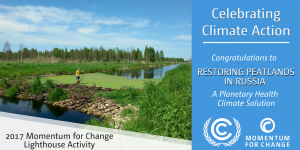
„Peatland restoration in Russia“ is lighthouse activity!
13/10/2017 The Greifswald Mire Centre was most happy to hear: Peatland restoration in Russia is one of 19 winners of the United Nations ‘Momentum for Change’ Climate Solutions Awards 2017! The project is spearheading the restoration of peatlands in Russia, thus reducing the incidence of fires in peatland areas and the resulting CO2 emissions and smoke particulates.
Michael Succow Foundation and Greifswald University, both partners in the GMC, are strongly involved. Out of 460 applications 19 ground-breaking initiatives from around the world will be honoured at the UN Climate Conference (COP23) in Bonn in November.
by NK
Wet peatlands for climate, future, people – forever
What all agreed on: RRR2017 final statement
04/10/2017 The concluding statement of the 2nd International Paludiculture Conference “Renewable resources from wet and rewetted peatlands (RRR2017, Greifswald 27-29 September 2017))” boils down on 4 pages what approx. 200 peatland scientists, practitioners and activists agreed on: Urgent action needed – stop drainage, rewet, implement paludiculture large scale! That’s because drained peatlands hamper the achievement of the Paris Agreement and the Sustainable Development Goals. Damages include enormous economic and environmental losses through greenhouse gas emissions, peat fires, loss of biodiversity, water pollution, soil degradation and desertification, and subsidence followed by an eventual loss of productive land. Thus peatlands have to be kept wet and productive! Paludiculture offers the solution to mitigate climate change and to adapt to effects of a changing climate such as sea level rise, droughts, and floods.
by NK
Paludiculture for the planet!
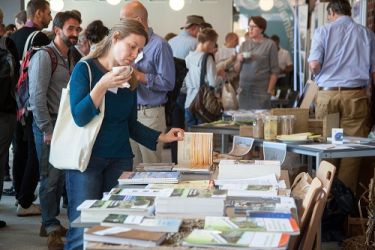
Conference week RRR2017started
27/09/2017 There is power in peatlands! At the International Paludiculture Conference RRR2017 - Renewable resources from wet and rewetted peatlands 27th-29th September in Greifswald scientists, practitioners and politicians discuss how to tap their potential for climate protection, alternative agriculture and saving great socio-economic costs. Text: Wet peatlands protect the world’s climate as gigantic carbon sinks. Drained peatlands, in contrast, globally emit over 2 Gt of carbon dioxide per year. To reverse this dramatic climate damage peatlands must be rewetted and can often still be cultivated. Paludiculture – the utilization of wet peatlands – can chant the spell and deliver renewable energy resources and biomass for building material or fodder while substituting fossil resources. Apart from this, wet peatlands offer ecosystem services such as nutrient removal, water retention and habitat provision. Almost 200 scientists, land owners, land users and environmentalists assemble at the RRR2017 to promote this promising and necessary concept.
by NK
RUMOOREN! - art meets peatlands
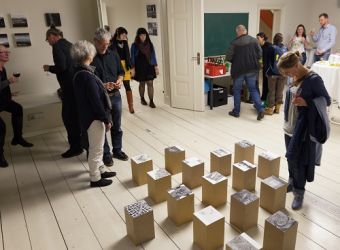
Turf sculptures and typha cushions - visit till 8th October at CDFI
22/09/2017 The art exhibition RUMOOREN! offers unusual perspectives on peatlands. Organised by the Greifswald Mire Centre in cooperation with the Caspar-David-Friedrich-Institute of Greifswald University, exhibits by 19 artists are presented, e.g. turf installations and typha cushions. The art pieces are intended to promote wider public perception of peatlands, climate protection and sustainable use. The use of peat in art is critically reflected.
About one hundred art and peatland lovers attended the vernissage on 24th September. RUMOOREN! is part of the international paludiculture conference week Renewable resources from wet and rewetted peatlands 2017. The exhibition is open 25th-28th September 8 am – 8 pm and 29th September – 8th October 12 am - 6 pm at the Caspar-David-Friedrich-Institute (Bahnhofstraße 46/47, Greifswald). The entrance is free.
by NK
Countdown for RRR2017
International week on paludiculture
07/09/2017 : Less than one month to go until the international paludiculture conference week RRR2017 from 25th - 30th September 2017 organised by the Greifswald Mire Centre starts. It offers a national and an international conference, a day of excursions and a Sphagnum farming workshop. The GMC is happy to welcome Prof. Ab Grootjans, Prof. Hans Joosten and Faizal Parish as key note speakers.
Besides the extensive scientific programme there is an amazing range of interesting related events: A show of machinery and technical equipment for agriculture of wet peatlands will occupy the entire market square in the heart of Greifswald on Wednesday 27th . Take the chance for a close look at e.g. modified snowcats or balloon tired reed harvesters! Stroll around in the ‘paludarium’ at the Botanical Garden of Greifswald University (Münterstraße 2, Greifswald) to see an exhibition of potential paludiculture plants and find more than 40 exhibition describing their use. See peatlands in new perspective and visit "RUMOOREN - Kunst trifft Moor" - an art exhibition initiated by the GMC in cooperation with the Caspar-David-Friedrich-Institute of Greifswald University. “RUMOOREN!” shows contributions by 20 artists aiming for public awareness and social exchange to gain more acceptance and understanding for peatland protection. Join a musical, literary journey “Between worlds in the wafts of mires” or an evening with nature conservationist Michael Succow. The biologist and laureate of the “Right Livelihood Award” takes you on a journey from bogs of Northwestern Germany via mires of the Southern Baltic Sea area up to the central German uplands and the Alps.
by NK
Big milestone for peatland restoration achieved
VCS methodology for rewetting of drained temperate peatlands online
05/08/2017 The Verified Carbon Standard (VCS) is the world’s leading voluntary programme for the certification of greenhouse gas emission reduction projects. The methodology outlines procedures to estimate the reduction of net greenhouse gas emissions resulting from project activities implemented to rewet drained peatlands in temperate climatic regions. It uses ground vegetation composition and water table depth as proxies for peatland greenhouse gas emissions, known as the ‘GEST’ approach (GEST: Greenhouse gas Emission Site Type), which has been developed at the Greifswald Mire Centre. The development of this methodology was funded by the Federal Ministry for the Environment, Nature Conservation, Building and Nuclear Safety (BMUB) within a peatland restoration project of the International Climate Initiative, the University of Greifswald, Partner in the Greifswald Mire Centre, and Silvestrum Climate Associates. Authors of the methodology are Dr. Igino Emmer (Silvestrum Climate Associates) and John Couwenberg (Greifswald University, Partner in the Greifswald Mire Centre).
by NK
A new push for Aquatic Warbler Conservation
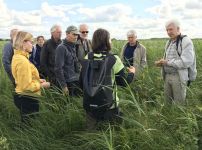
Salvation of the globally threatened mire bird not yet given up
13/07/2017 The beginning of July could symbolically be called a new begin for aquatic warbler conservation. Experts from six countries met in Zuvintas (Lithuania) to discuss practicalities of a new method for aquatic warbler conservation - translocation. As Martin Flade, the Chairman of International Aquatic Warbler Conservation Team (AWCT), pointed out, there is much more good-quality habitat than area occupied by the bird. In some areas the population is so small that it could not recover itself naturally. During a currently running LIFE project , it is planned to transfer aquatic warbler juveniles from Belarus to Lithuania. According to Zymantas Morkvenas, director of Baltic Environmental Forum Lithuania and project manager of the LIFE project, the main goal is to test the technique that later on could help to save other small populations in other countries. The Scientific Advisory Board includes representatives of International Aquatic Warbler Conservation Team (AWCT), Royal Society for the Protection of Birds (RSPB), University of Cambridge, Polish Society for the Protection of Birds (OTOP), Greifswald Mire Centre (GMC), "Earthmind", Ministry of Environment of the Republic of Lithuania, Zuvintas Biosphere Reserve Directorate, and Baltic Environmental Forum Lithuania. The current status and perspectives for conservation of the small Pomeranian population will be discussed at a Polish-German meeting 21.07.2017 in Criewen.
by NK
Kick-off for CLEARANCE
Estimating values of wetland buffer zones
12/07/2017 Evaluating costs and benefits of Wetland Buffer Zones including market and non-market values is one task of the recently started interdisciplinary EU project CLEARANCE. Wetland buffer zones are wetlands located between the agricultural land and aquatic ecosystems, capturing nutrient-rich runoff water before it reaches rivers and lakes to reduce nutrient loads in surface waters at water-land interface. Consortium partners are, together with Greifswald University, Kiel University, two universities in Warsaw (Poland), Aarhus University (Denmark), Nijmegen University (the Netherlands) as well as the Leibniz-Institute of Freshwater Ecology and Inland Fisheries (IGB) Berlin as well as a German and a Polish NGO. From 2017 until 2020 scientists will assess values related to recreation, biodiversity, nutrient removal, biomass utilisation, etc. on catchments in Denmark, Germany, the Netherlands and Poland. CLEARANCE will deliver knowledge on multifunctional wetland buffer zones and raise awareness in all partner countries.
by NK
Peatlands matter!
Focus on peatlands at Global Landscape Forum
19/05/2017 The Global Landscape Forum at 18th May was fully dedicated to peatlands! With the slogan “Peatlands matter!” the event aimed to bring together local and global policymakers, stakeholders and private sector interests in order to identify landscape-level solutions. It also intended to accelerate measurable action on the ground in negotiating conflicting land use demands in these vital ecosystems.
The international audience discussed ways of peatland conservation, restoration and sustainable use in paludiculture. The event had 425 people attending in Jakarta as well as over 1,000 views of the event livestream and 5,000,000 people reached through Twitter. Peatlands matter and they must be wet!
by NK
Brand new and all about Europe’s peatlands
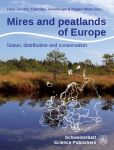
New book of the Greifswald Mire Centre
10/05/2017 After more than 25 years of preparation, the long expected book Mires and peatlands of Europe is now available. This book provides – for the first time in history – a comprehensive and up-to-date overview of mires and peatlands in biogeographic Europe. Written by 134 authors, the book describes mire and peatland types, terms, extent, distribution, use, conservation, and restoration individually for each country and integrated for the entire continent. Complemented by a multitude of maps and photographs, the book offers an impressive and colourful journey, full of surprising historical context and fascinating details, while appreciating the core principles and unifying concepts of mire science. The publication of this book was coordinated for the International Mire Conservation Group by the Greifswald Mire Centre. The publication was co-sponsored by the Norwegian University of Science and Technology (NTNU), University Museum, Trondheim, Norway.
by NK
Global Peatland Initiative at Climate Conference
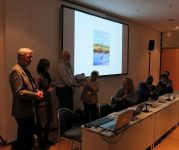
Side event at 9th May in Bonn
09/05/2017 The book Mires and peatlands of Europe came hot off the press when it was launched at the side event of the Global Peatland Initiative (GPI) at the Climate Change Conference in Bonn 9th May 2017. The side event provided an opportunity for governments, institutions, stakeholders and partners to exchange on advancing efforts to protect peatlands and was jointly organised by UN Environment, FAO, the Ramsar Convention, Wetlands International and GMC. The three editors of the book - Hans Joosten, Franziska Tanneberger (both GMC) and Asbjørn Moen - handed over the first copy of the book to Nur Masripatin, Director General for Climate Change for the Ministry of Environment and Forestry of Indonesia, highlighting major lessons from Europe how to deal wisely with peatlands to avoid further degradation. This feeds perfectly into the vision of enhanced south-south-north exchange under the GPI, discussed during an interactive panel discussion chaired by Hans Joosten. Especially ‘newcomers’ in the peatland community like panel member Joseph Badevokila, national focal point to the UNFCCC of the Republic of Congo, were delighted by the vast experience and knowledge among the partners of the GPI. The side event paved the way to the upcoming negotiations in the land use sector under the UNFCCC and the upcoming Global Landscape Forum: Peatlands matter in Jakarta on 18th May.
by NK
World Migratory Bird Day
Greifswald Mire Centre offering excursion
05/04/2017 2017 Just outside of Greifswald the Karrendorfer Wiesen provide a splendid location for bird watching at World Migratoy Bird Day! The Greifswald Mire Centre is inviting birdlovers on a guided tour to see long-distance migrants such as the sedge and the reed warbler, wheatears, redshanks and avocet. Back from their wintering grounds in sub-Sahara Africa they breed there in reeds, on the salt meadows and the shore area. Waders such as wood sandsnipers and dunlins might also be spotted on their way further North. Apart from that there are skylarks and greylag goose. The salt meadows of Karrendorfer Wiesen do not ony present a rare breeding habitat for migratory birds. After its restoration this coastal flood peatland serves as wave breaker. Its vegetation slows erosion of the shore zone and promotes sedimentation. Thus it contributes to the stability of the flat coasts of the Baltic Sea. After flooding, natural waterways ensure rapid drainage. In addition, coastal flood peatlands are significant carbon sinks and therefore important for climate protection.
by NK
Mandatory accounting for managed wetlands
New policy paper with Wetlands International and Birdlife
05/04/2017 Wetlands International European Association, Greifswald Mire Centre and Birdlife jointly stress the need for a regulation which takes into account all land use categories to reflect what “the atmosphere sees”. Thus it is of utmost importance to agree for a mandatory accounting for managed wetlands. The European Parliament and Council currently debate on how to include greenhouse gas emissions and removals from land use, land use change and forestry (LULUCF) into the 2030 EU climate and energy framework. Read the full paper!
by NK
30 good reasons to safeguard peatlands!
New Ramsar peatland portal with GMC contributions
30/03/2017 "30 good reasons to safeguard peatlands!" are freshly assembled in a Ramsar Convention policy brief. It compiles the results from the international workshop “Peatland Conservation and Wise Use in the Context of Climate Change” held at the International Academy for Nature Conservation on the Island of Vilm (Germany) in September 2016. Moreover all presentations of the workshop, including four contributions of the Greifswald Mire Centre, and an extensive workshop documentation are available now on the new peatland web portal of the Ramsar Convention, highlighting the importance of peatlands.
by NK
DISQOVER workshop
Land cover reconstruction from pollen data
28/02/2017
From 7th – 10th September the GMC offers the 2017 DISQOVER workshop on methods of quantitative land cover reconstruction from pollen data. The workshop introduces and discusses these methods and will then focus on implementation of the methods in R. Following an introduction, we will explore the capabilities and critical parameters of each method. The number of participants is limited to 15.
For more information and contact, please contact Dr. Martin Theuerkauf (martin.theuerkauf(at)uni-greifswald(dot)de).
by NK
Peatlands in EU's policy framework
Report just published
15/02/2017
The project Peatlands in the EU Regulatory Environment analysed the impact of political and legal framework conditions of the EU on peatlands and organic soils in the Member States. Poland and Estonia served as as exemplary Member States and the effects were assessed in much detail in two case studies. The concluding report is now available for download from the website of the German Federal Agency for Nature Conservation (BfN). It has been prepared by Jan Peters (Greifswald Mire Centre) and Moritz von Unger (Silvestrum).
Further information on the project offers the website of the German Environment Agency (UBA).
by NK
RRR2017 - 2nd Announcement
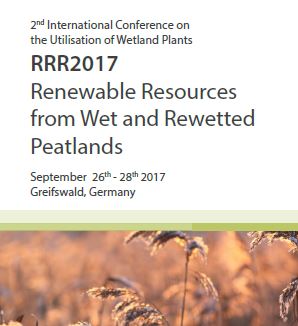
09/02/2017
The Greifswald Mire Centre welcomes participants coming from a range of different disciplines to join the paludiculture conference week „Renewable Resources from Wet and Rewetted Peatlands 2017 (RRR2017)“. The 2nd Announcement includes a great excursion programme and we are happy to announce our key note speaker Prof. Ab Grootjans, Prof. Hans Joosten and Faizal Parish.
The RRR2017 from 25th - 30th September 2017 comprises a national and an international part, a day of excursions and a Sphagnum farming workshop.
Submissions of abstracts for oral or poster presentations are welcome before 28th February. Exhibition space for contractors, manufacturers and any other stakeholders will be provided indoors and outdoors.
Register for the national and/or international conference and for excursions at www.rrr2017.com. You’ll thus receive regular updates on RRR2017.
by NK
World Wetlands Day at 2nd February
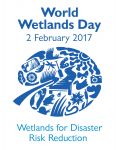
Exkursion and cattail-harvest
03/02/2017 With two events the Greifswald Mire Centre raised attention for the importance of healthy wetlands and how they help us to cope with extreme weather events at World Wetlands Day 2017 on 2nd February. Just outside of Greifswald the Karrendorfer Wiesen provide a splendid example: During floods this coastal flood peatland serves as wave breaker. Its vegetation slows erosion of the shore zone and promotes sedimentation. Peatlands like this contribute to the stability of the flat coasts all around the Baltic Sea. After flooding, natural waterways ensure rapid drainage. In addition, coastal flood peatlands are significant carbon sinks and therefore important for climate protection. The Greifswald Mire Centre offered a public excursion to the Karrendorfer Wiesen. Some 25 people joined the tour in this fascinating peatland at a frosty temperature.
Moreover, the Greifswald Mire Centre is proud of a little premiere: the first mechanical cattail harvest in Western Pomerania! The demonstration also took place at World Wetlands Day 2017 on 2nd February. Cattail was harvested on an agriculturally used peatland, where a cattail stand had spontaneously established. In cooperation with local reed harvesters, the mechanical harvest was tested with a Seiga (a amphibious vehicle with low ground pressure). After the successful trial, there was a fruitful exchange on possibilities of cattail cultivation on agriculturally used rewetted peatlands in the region.
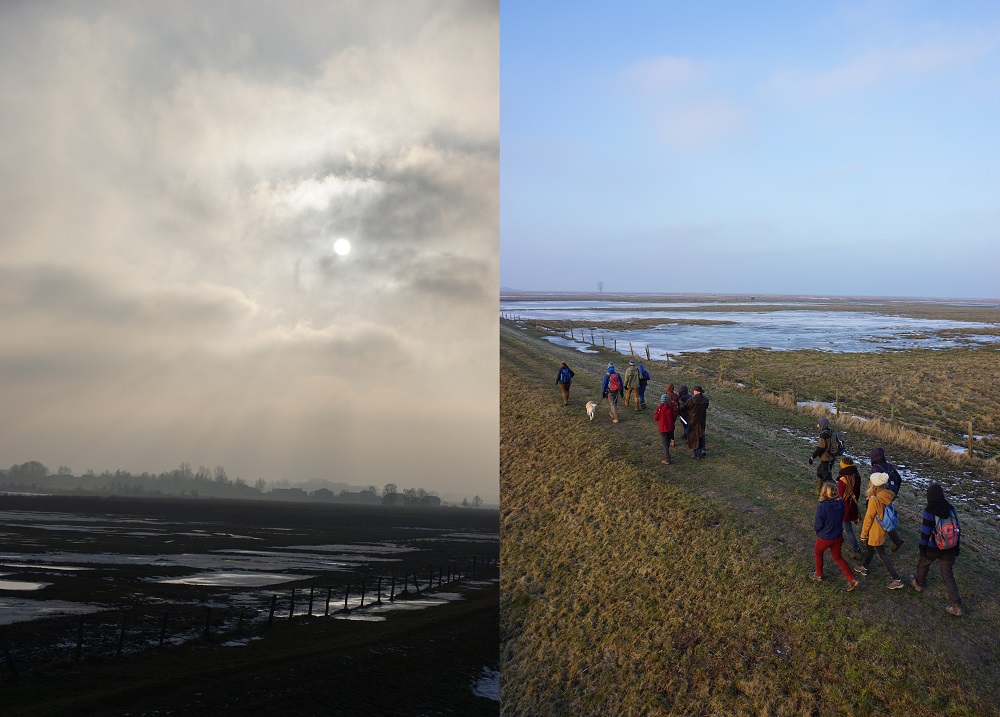
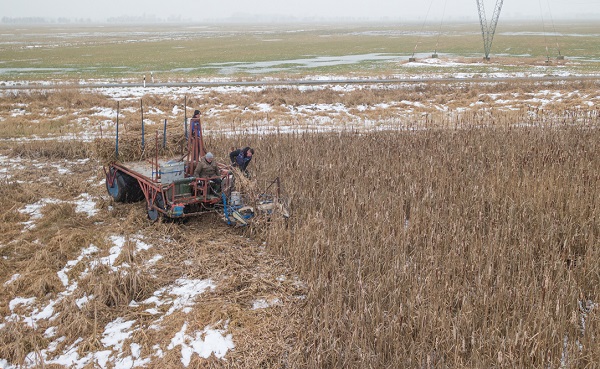
by NK
Tropical peatland agriculture is devastating
Evidence published by 139 peatland scientists
10/01/2017 After the International Peat Congress 2016, held with over 1,000 participants in Kuching (Malaysia), articles in leading regional newspapers reflected a general consensus and summary of the conference, that current agricultural practices in peatland areas, such as oil palm plantations, do not have a negative impact on the environment. Now a global alliance of 139 peatland scientists published their opinion in Global Change Biology: There is overwhelming evidence that business-as-usual management is not sustainable for tropical peatland agriculture. Failing to recognize the devastating consequences of the current landuse practices on peat soils could mean that the next generation will have to deal with an irreversibly altered, dysfunctional landscape where neither environment nor society, globally or locally, will be winners. Open access has been facilitated by Greifswald Mire Centre and Department of Forestry Sciences, University of Helsinki.
